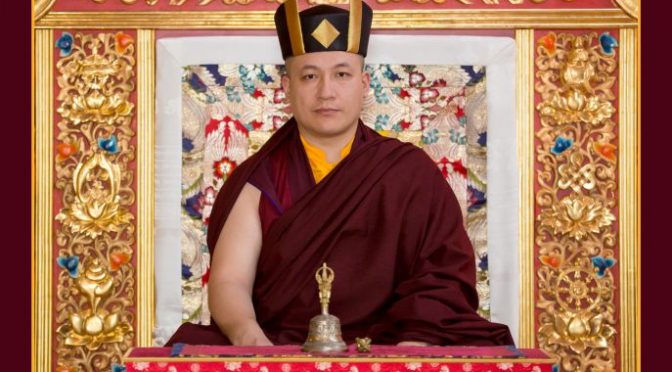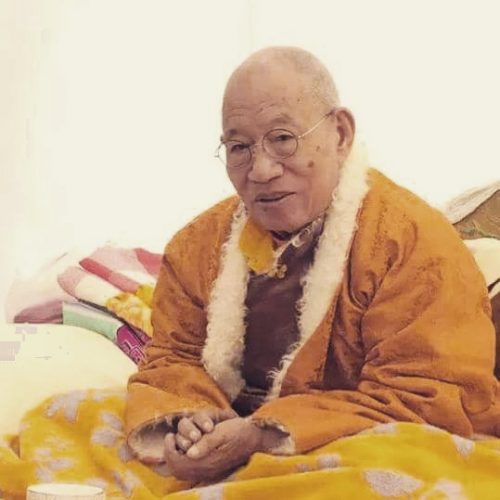第十七世大寶法王嘉華噶瑪巴泰耶多傑,於衛塞節的開示
親愛的法友,
下週一,5 月 16 日,是衛塞節(也稱為佛陀 Jayanti或佛Purnima 的日子),這是一個紀念我們歷史上的釋迦牟尼佛誕生、成道和入滅的佛教節日。
當然,摘自《華嚴經。入法界品》的《普賢行願品》,總結了它的精髓,揭示在我們這個宇宙的每一個粒子之上,都有與宇宙中的原子一樣多的清淨界,而且每一個淨土中,都安住著無量數的佛菩薩。
這不僅僅是一個比喻,它確實描述了事物的實際情況。但是,由於我們人身條件的限制,我們只能以線性的方式一次看到一件事物,因此我們談論的一系列古佛,是一個接一個地出現。
當然,在當今時代,我們有幸稱自己為無數佛之一的佛弟子,他以悉達多太子出世,於菩提迦耶菩提樹下圓滿覺悟,其後成為人所共知的釋迦牟尼佛。
作為佛教徒,我們認為衛塞節是農曆年中最殊勝的日子,我們會盡最大努力以至誠心慶祝它。
我們會嘗試利用這一天來憶念和行持佛陀的教法。
而且我認為善用這一天最實際和最相關的方法之一,就是專注於皈依的修行。我相信你們大多數人一定從你們的上師獲到了皈依戒。
皈依是趣入佛教徒道路的第一步,也是整個菩提道的基礎。皈依佛、法、僧而趣入這條道路,即是個人承諾停止惡行,這是走向解脫和圓滿覺醒、成佛的基石。
因此,我想鼓勵大家在衛塞節淨修皈依,同時念誦普賢行願品。
這是我對所有同修的請求。
除此之外,對於熟悉八關齋戒的你們,和過去曾接受過八關齋戒並理解其解釋的人,我鼓勵你們在衛塞節受持八關齋戒。
一如概往,請不要將我的這個建議誤認為是命令,誤以為有義務遵守的命令。我很清楚你們許多人都有非常繁忙的事務,承擔著無數的責任。
但是,如果你感到有所啟發,並有時間和機會的話,在 24 小時,即是從一個日出到下一個日出的時間,我會鼓勵你全身全意投入這個修持。
我相信它有莫大的好處,因為它讓我們有機會,至少在一年之中的一天,觀察沉默。我在這裡說的不僅僅是嘴巴上的沉默,更重要的是心的沉默。
只需花 24 小時進行練習,就能讓我們的身語意從平時的忙碌中放鬆下來。我並不是暗示我們的社會責任和我們生活中的各種責任是不重要或毫無意義的,完全不是這個意思。這些責任與別人、個人、社區、社會有關,所以它們當然很重要。
只是,如果我們能夠透過這個修行獲得更清晰的視野和更深刻的洞察力,那麼我們的社會責任就會越來越不那麼沉重。
社會責任是人類重要的一部分,但我們可以以最輕鬆、最自然的方式來處理它們,而不會導致焦慮或掛礙。如果我使用太陽及其「職責和責任」來比喻,我想要傳達的訊息會更容易比理解。形像化地說的話,就是每天太陽升起,傍晚落下,它為植物、動物和人類提供溫暖和生命,這是太陽重要的職責。毫無疑問,太陽日復一日地履行這些「職責」,卻從不陷入困境或壓力,也沒有任何掛礙。
我覺得,這就是這個修持的好處之一,它讓我們變得好像太陽一樣,它幫助我們完全沒有障礙、焦慮、牽掛,任運自在地升起和落下、活著和死亡。
當然,如果你不能在衛塞節修持八關齋戒,總有第二天,如果沒有,那就是後天。所以,總會有機會的。
對於那些還不熟悉八關齋戒的人,我建議如果有機會,找一天嘗試一下,是一種很好的體驗。畢竟,每個人都喜歡嘗試新事物,而八關齋戒的練習不需要付出很大勞力,因為它是一個既簡單且平靜而愉快的體驗。
在這背景下,有兩個經常會引起誤解的題目,我想藉此分享一些我的看法。
第一個是,「戒律」一詞及其所傳達的內涵。這個英文單詞,就像它的藏語對應詞 sdom pa 一樣,似乎帶有一種限制、封閉或約束的語氣。我認為這會給我們帶來錯誤的想法。並不是說 sdom pa 這個詞本身有什麼問題,「束縛」或「禁閉」實際意思是關閉我們通往惡行之身語意之門。
儘管如此,對某些概念的理解方式在很大程度上取決於我們當時所處時代的精神、那個年代的心態。因此,對於過去的幾代人來說,聽到「對惡行之門關閉」的說法可能是完全有效的,甚至是鼓舞人心的。這是描述「戒律」的一種清晰而實在的方式。
然而,以現代主義、環境問題和全球化為標誌的當今時代,既有其自身的優勢,但也有其缺陷。一方面,我們比以往任何時候都擁有更多的自由和機會,但另一方面,我們面臨著如此多的選擇、如此多的壓力,以及前所未有的責任和挑戰。我個人認為,當代人類的狀況是,我們沒有任何空間可以聽到問題或挑戰。因此,如果我們聽到「惡行之門關閉」之類的話,我們可能不會感到鼓舞或激勵,作為當今時代的孩子,我們總是喜歡聽到事情美好的一面、積極的一面,甜蜜的一面。
可幸的是,藏語sdom pa 與許多佛法術語一樣,具有廣泛的含義、語調和內涵。因此,我們可以簡單地注意一硬兩面的另一面,並利用另一個可能更適合我們這個時代的文化,「解束」這個解釋可能就更合適我們。畢竟,每當我們關上一扇門時,另外一道門就會打開,由於我們總是喜歡聽到事物積極的一面,所以當我們從打開、解綁的角度理解「戒律」或 sdom pa 時,我們可能會感到更有動力和鼓舞。
這可以幫助我們了解,修行戒律或任何其他佛法的修持,並不是限制我們、禁止我們、束縛我們。其實恰好相反:佛法的一切修行,都是為了解脫、開啟、打開我們的心。
所以誰知道,也許有一天我們會想出一個新的詞語,又或者下一尊佛會創造一個新詞而不是「戒律」,縱使只是暫時的,如果有意義的話,我覺得我們可以將它們不當作「戒律」看待,而是「解束」。
我想簡單的談第二點,是我們經常帶入佛法修行的使命感。
我一直受到《入菩薩行論》啟發,寂天菩薩說他這部作品不是為了他人,而是為了自己的利益。他說這話並不是說他沒有菩提心,他也不只是謙虛。他只是很踏實、沒有誇大其詞。他只是在做他正在做和喜歡做的事情。所以沒有感到負擔,沒有為什麼要寫這部論的使命感。他這樣做不是為了榮耀或名聲,也不是為了拯救世界。
任何一個頭腦清醒的人都會明白,這個世界還在繼續,沒有必要為個人或集體的使命,為救度眾生,為拯救世界而操心。這些只是激勵自己的方法,如果我們發現它們有幫助和能鼓舞人心的話,那麼我們當然可以利用它來專注我們的皈依或八關齋戒的修行。
但我覺得沒有必要揮動大橫額、懸掛巨型海報,也沒有必要用擴音器在屋頂上宣揚「我的修行是在普度眾生或拯救世界」。
對我來說,所有這一切都歸結為製造另一場情緒的混亂。而如果你製造這樣的情緒混亂,如果你承諾和發誓「從這一刻起直到我最後一天,我將致力於拯救世界」,那一刻你可能會感到解放。但實際上,這樣做與這個世界並沒有太大的關係。除了給自己製造不必要的壓力、負擔和焦慮之外,它不會有任何收穫。
相比之下,寂天菩薩只是享受他正在做的事情,就是如此簡單。當你做你喜歡做的事情時,一切都會變得容易;即使你必須拯救世界,它也會變得容易。
中文詞語裡,代表「喜悅」或「高興」的字是「開心」,這個詞語的字面字意思是「打開心扉」。
我認為這就是修持「戒律」的真正目的,解開我們的束縛,幫助我們敞開心扉。
因此,親愛的法友們,這是我在衛塞節這一天對你們所有人的祝願,希望你們能抽出一些時間來修行佛法,找到快樂和打開心扉。
致上祈願
第十七世大寶法王嘉華噶瑪巴泰耶多傑
Thaye Dorje, His Holiness the 17th Gyalwa Karmapa, gives the following message on the occasion of Vesak, 2022.
Dear Dharma friends,
Next Monday, May 16th, marks the day of Vesak (also known as Buddha Jayanti or Buddha Purnima) – the Buddhist festival that commemorates the birth, the enlightenment and the Parinirvana of our historical Buddha Shakyamuni.
Of course, Samantabhadra’s King of Aspiration Prayers (which is extracted from the Gaṇḍavyūha chapter of the Avataṃsaka Sutra, and sums up its essence) tells us that atop every particle in our world there are as many pure realms as there are atoms in the universe, and that in each of these pure realms reside myriads of Buddhas and Bodhisattvas.
This is not just an analogy – it describes the way things actually are. However, due to the limitations of our human condition we are only able to witness things one at a time, in a linear manner, and accordingly we talk about a series of historical Buddhas, appearing one after the other.
And of course, in our current era we have the good fortune of being able to call ourselves the disciples of one of these countless Buddhas: the one who started life as Prince Siddharta, attained perfect awakening under the Bodhi Tree in Bodhgaya, and thereafter became known as Buddha Shakyamuni.
As Buddhists we consider Vesak to be the most sacred day of the lunar year, and we do our best to celebrate it with as much sincerity as possible.
We recall the Buddha’s teaching, and we try to use this day to implement however much of it we are able to.
And I think that one of the most practical and relatable ways of observing this day is by focusing on the practice of refuge. I believe that most of you must have received the Buddhist refuge vows from one of your teachers.
The taking of refuge marks the first step on the Buddhist path, and it’s also the foundation for the whole journey. An individual entering this path by taking refuge in the Buddha, Dharma and Sangha promises to give up non-virtuous actions, which is the very basis for journeying towards liberation and perfect awakening, Buddhahood.
So therefore, I would like to encourage all of you to observe the day of Vesak by focusing on the refuge practice, and along with this, please also recite Samantabhadra’s King of Aspiration Prayers.
This is what I would like to ask of all my fellow practitioners.
Besides that, for those of you who are familiar with the practice of Sojong, who have taken the Sojong vows in the past and have received explanations on them, I would encourage you to devote the Vesak day to this practice.
As always, please don’t mistake this suggestion of mine for a command, an order that you are obligated to follow. I’m well aware of the fact that many of you have very busy schedules, with countless obligations and responsibilities.
But should you feel inspired and have the time and opportunity, then – for a period of 24 hours, from one sunrise to the next – I would encourage you to devote yourselves to this practice.
I believe that it has great benefit, because it gives us an opportunity to observe some sort of silence, at least for one day in a year. I am not just talking about verbal silence here, but, more than that, also silence from thoughts.
Dedicating just 24 hours to this practice will allow our body, speech and mind to relax from their usual busyness. I don’t mean to imply that our social duties and the various responsibilities we have in our lives are unimportant or meaningless. Not at all – they are related to people, to individuals, to communities, to society, so of course they are important.
It’s just that if we could gain greater clarity of view and deeper insight through these practices, then our social duties will become less and less heavy and burdensome.
Social duties and responsibilities are part and parcel of being human, but it is possible to go about them in the most relaxed and natural way, without anxiety or hang-ups. Maybe what I’m trying to convey here will be easier to understand if I use the analogy of the sun and its ‘duties and responsibilities’. Figuratively speaking, it’s part and parcel of the sun’s duties to rise every morning, to set every evening, and to give warmth and life to plants, animals and human beings alike. And without fail, the sun goes about fulfilling these ‘duties’ day in, day out, without ever getting stuck or stressed, without any hang-ups.
This, I feel, is one of the benefits of this practice – it allows us to become more like the sun: it helps us to function, to rise and to set, to live and to die, without being stuck, without anxiety, without hang-ups.
And of course, if you can’t practice Sojong on the day of Vesak itself, there’s always the next day, and if not, then the day after that. So, there’ll always be another opportunity.
For those of you who are not yet familiar with the practice of Sojong, I would suggest that it might be a good experience to try it one day, should the occasion arise. Everybody likes to try new things, after all, and the practice of Sojong doesn’t require any great exertion or effort – it’s simple, peaceful, and enjoyable.
In this context, I would like to share a few reflections on two topics that I feel can sometimes be a source of misunderstanding.
The first one is the term ‘vow’ and the connotations it transports. This English word – just like its Tibetan counterpart sdom pa – seems to carry a tone of restriction, of closing or binding; and I think this can give us the wrong idea. Not that there is anything wrong with the term sdom pa itself – what the ‘binding’ or ‘closing’ actually implies is shutting the doors of our body, speech and mind to non-virtues.
Still, the way in which certain notions are perceived is very much dependent on the spirit of the time we live in, the contemporary mentality, and the prevailing trends. Thus, for past generations it may have been perfectly valid and even inspiring to hear about ‘shutting the door to non-virtues’. It’s a clear-cut and down-to-earth way of describing the vows.
However, the present time, which is marked by modernity, environmental issues and globalisation, has its own advantages as well as its own drawbacks. On the one hand we have more freedom and opportunities than ever before, but on the other hand we are faced with so many choices, so much stress, and an unprecedented number of tasks and challenges. It seems to me that the contemporary human condition is such that we don’t have any room to hear about problems or challenges. And so therefore, if we hear about ‘shutting the door to non-virtues’ and so on, we may not feel encouraged or inspired. As children of our current era, we always like to hear about the bright side of things, about their positive aspect, their sweet part.
Fortunately, the Tibetan term sdom pa – like so many Dharma terms – has a wide range of meanings, tones and connotations. And so we can simply focus on the flip side of the coin and tap into another nuance that may be more appropriate for our era, and that could very well be something like ‘unbinding’. After all, whenever we close one door another one opens, and since we always prefer to hear about the positive side of things, we may feel more motivated and inspired when we approach the vows, or sdom pa, from the angle of opening, unbinding.
This can help us gain a sense that the purpose of practising vows, or doing any other Buddhist practice, is not to constrain us, close us, tie us up. In fact, it’s quite the opposite: all the practices of the Buddha Dharma are meant to liberate us, unbind us, open our heart.
So who knows, maybe in time we’ll come up with a new term – or maybe the next Buddha will invent a new word instead of ‘vow’. But just temporarily, if it makes sense, I feel that we might think of them not as ‘vows’ but as ‘unbinders’.
The second point I would like to talk about briefly is the sense of mission we often bring to our Dharma practice.
I have always felt inspired by the beginning of the Bodhicaryāvatāra, where Śāntideva says that he’s not composing this work for the sake of others but for his own benefit. When saying this he doesn’t mean that he doesn’t have bodhicitta; nor is he just being modest. He is just being practical, down to earth, not exaggerating things. He’s simply doing what he’s doing, and he enjoys doing it. So there is no sense of a burden, a mission of why he is composing this text. He’s not doing it for glory or fame, or to save the world.
Any one of us who has a clear mind will understand that the world just goes on, and that there’s no need to worry too much about a personal or a collective mission, about saving all sentient beings, or saving the world. These are just ways to motivate ourselves, and if we find them helpful and inspiring, then of course we can dedicate our practice of refuge or Sojong in that way.
But I feel that there is no need for waving big banners, hanging gigantic posters, or having loudspeakers proclaim from the top of the roof that “I’m dedicating my practice to saving all sentient beings”, or to saving the world.
To me all of this just comes down to creating another commotion. And if you create such a commotion, if you curse and promise and swear that “from this moment onwards until my last day I will devote myself to saving the world”, it may feel liberating at that moment. But actually, the weight of that commotion doesn’t have much relation to the world. It will not achieve anything, besides creating unnecessary stress, burden, and anxiety for yourself.
By contrast, Śāntideva just enjoying what he’s doing is so simple and relatable. When you enjoy doing what you’re doing, everything becomes easy; even if you do have to save the world it becomes easy.
In Chinese, the word for ‘joyful’ or ‘happy’ is kāixīn – which literally means ‘open heart’.
And I think that’s the real purpose of the practice of vows: unbinding us and helping us open our heart.
So therefore, dear Dharma friends, this is what I wish for all of you on this day of Vesak – may you be able to spare some time to use the practice of the Buddha Dharma to find joy and open your heart.
With prayers
Thaye Dorje, His Holiness the 17th Gyalwa Karmapa
https://www.karmapa.org/karmapas-message-for-vesak-
(中文翻譯由本中心翻譯小組負責。若有錯漏,請見諒。節錄或載列文章內容以原文為準。)








